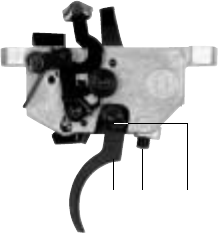
26
1. Trigger weight
Adjust the trigger weight with set screw
No. 2:
•if you turn it to the right (clockwise):
trigger weight is increased (+)
•if you turn it to the left (counter-clockwise):
trigger weight is decreased (-)
Trigger weight and first stage weight
depend on each other with regard to the
mechanic mechanism. If one of them is
changed there will always be a corres-
ponding change of the other as well.
2. Sear engagement
The sear engagement is the distance bet-
ween the second stage and the release of
the trigger.
Important note:
To protect your precise trigger and to
Two and single stage triggers
5094
32 1
guarantee perfect operation you should
always close the action carefully. If the sear
engagement of single stage triggers is too small
and the trigger weight is too low or if the first
stage of two-stage triggers is too short, the
trigger might release inadvertently by a sudden
impact or too powerful closing of the action if
the gun is loaded and not in the ”safe“ position.
Adjustment of the sear engagement for
assembled two-stage triggers with set
screw No. 1:
•if you turn it to the left (counter-clockwise):
sear engagement is shortened
•if you turn it to the right (clockwise):
sear engagement is extended
Adjustment of an optimum sear engagement:
Make sure your rifle is not loaded. Cock
your rifle and release the trigger. Check if
the trigger releases as desired.
The sear engagement is too long:
There is a small distance between the
second stage and the release of the trigger.
•Turn set screw No. 1 counter-clockwise
after cocking and releasing (approxi-
mately 1/8 turn each).
•Repeat this process until you do not feel
the second stage anymore. Then turn
1
/
4
turn back to the right. Thus the
optimum sear engagement is adjusted.
The sear engagement is too short:
There is no second stage. The trigger
releases un-defined without second stage.
•Turn set screw No. 1 clockwise for at least
1
/
4
turn after cocking. Then release the
trigger and check if there is a second


















